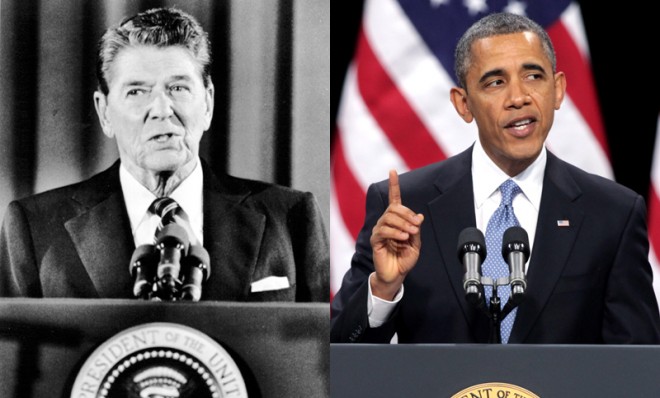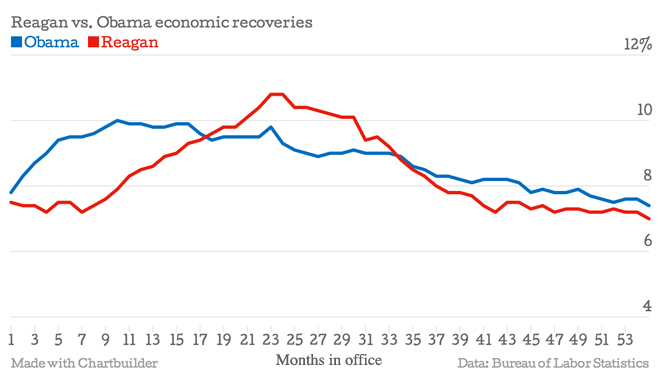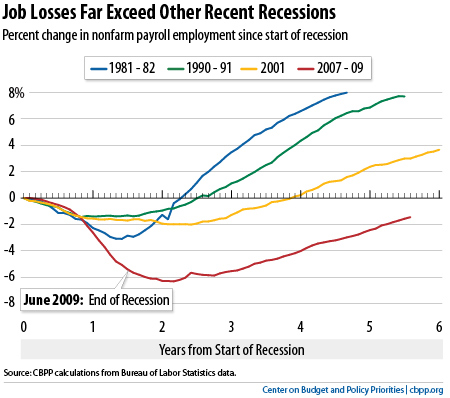How Obama's economic recovery stacks up against Reagan's
Yes, it's a competition


A free daily email with the biggest news stories of the day – and the best features from TheWeek.com
You are now subscribed
Your newsletter sign-up was successful
The economy added 162,000 jobs in July, falling just shy of expectations. Despite that sluggish growth, the unemployment rate ticked down to 7.4 percent, from 7.6 percent.
The leading GOP critique of President Barack Obama has been that he's been a poor steward of the economy. A more conservative leader, one in the vein of former President Ronald Reagan, the critics say, would have had us out of this economic hole quicker.
Reagan, after all, took office during a recession as well. So how does the recovery under Obama compare to the one under Reagan? The chart below tracks the monthly unemployment rate under each president starting at the beginning of their tenures:
The Week
Escape your echo chamber. Get the facts behind the news, plus analysis from multiple perspectives.

Sign up for The Week's Free Newsletters
From our morning news briefing to a weekly Good News Newsletter, get the best of The Week delivered directly to your inbox.
From our morning news briefing to a weekly Good News Newsletter, get the best of The Week delivered directly to your inbox.

As Newt Gingrich loved to point out in the last Republican presidential primary, Reagan presided over a much swifter recovery — though his economic turnaround later tapered off considerably.
However, that's a somewhat reductive reading of the data.
First and foremost, the unemployment rate is just one measure of economic health, and its rise or fall is dependent on far more factors than just a president's actions.
Second, the recent recession was far worse than the one America faced in the early 1980s, relatively speaking. The U.S. shed more jobs as a percentage of the economy between 2007-09 than it did back then, leaving Obama with a deeper hole to dig out from.
A free daily email with the biggest news stories of the day – and the best features from TheWeek.com
This chart from the Center on Budget and Policy Priorities shows the difference:

Reagan also had a more favorable climate for bringing down the unemployment rate, as CNN's Charles Riley pointed out:
Reagan had an advantage over Obama: The recession of the early 1980s was caused by runaway inflation, which the Federal Reserve countered by hiking interest rates. When inflation dropped, the Fed lowered rates and a massive economic boom resulted.
The major causes of the recent recession were a banking crisis and housing bubble that exploded during President George W. Bush's final months in office.
Another difference: With comparatively small debt loads, Reagan was able to push through a 23 percent across-the-board cut of individual income tax rates. Obama, meanwhile, entered the presidency with substantial budget deficits and an economy contracting at a rate of 6.7 percent. [CNN]
However, the side-by-side comparison does help explain why voters still give Obama poor marks on his handling of the economy, and why Republicans have chalked up the economy's mediocre performance to Obama's leadership.
Jon Terbush is an associate editor at TheWeek.com covering politics, sports, and other things he finds interesting. He has previously written for Talking Points Memo, Raw Story, and Business Insider.
-
 Local elections 2026: where are they and who is expected to win?
Local elections 2026: where are they and who is expected to win?The Explainer Labour is braced for heavy losses and U-turn on postponing some council elections hasn’t helped the party’s prospects
-
 6 of the world’s most accessible destinations
6 of the world’s most accessible destinationsThe Week Recommends Experience all of Berlin, Singapore and Sydney
-
 How the FCC’s ‘equal time’ rule works
How the FCC’s ‘equal time’ rule worksIn the Spotlight The law is at the heart of the Colbert-CBS conflict
-
 The billionaires’ wealth tax: a catastrophe for California?
The billionaires’ wealth tax: a catastrophe for California?Talking Point Peter Thiel and Larry Page preparing to change state residency
-
 Bari Weiss’ ‘60 Minutes’ scandal is about more than one report
Bari Weiss’ ‘60 Minutes’ scandal is about more than one reportIN THE SPOTLIGHT By blocking an approved segment on a controversial prison holding US deportees in El Salvador, the editor-in-chief of CBS News has become the main story
-
 Has Zohran Mamdani shown the Democrats how to win again?
Has Zohran Mamdani shown the Democrats how to win again?Today’s Big Question New York City mayoral election touted as victory for left-wing populists but moderate centrist wins elsewhere present more complex path for Democratic Party
-
 Millions turn out for anti-Trump ‘No Kings’ rallies
Millions turn out for anti-Trump ‘No Kings’ ralliesSpeed Read An estimated 7 million people participated, 2 million more than at the first ‘No Kings’ protest in June
-
 Ghislaine Maxwell: angling for a Trump pardon
Ghislaine Maxwell: angling for a Trump pardonTalking Point Convicted sex trafficker's testimony could shed new light on president's links to Jeffrey Epstein
-
 The last words and final moments of 40 presidents
The last words and final moments of 40 presidentsThe Explainer Some are eloquent quotes worthy of the holders of the highest office in the nation, and others... aren't
-
 The JFK files: the truth at last?
The JFK files: the truth at last?In The Spotlight More than 64,000 previously classified documents relating the 1963 assassination of John F. Kennedy have been released by the Trump administration
-
 'Seriously, not literally': how should the world take Donald Trump?
'Seriously, not literally': how should the world take Donald Trump?Today's big question White House rhetoric and reality look likely to become increasingly blurred
